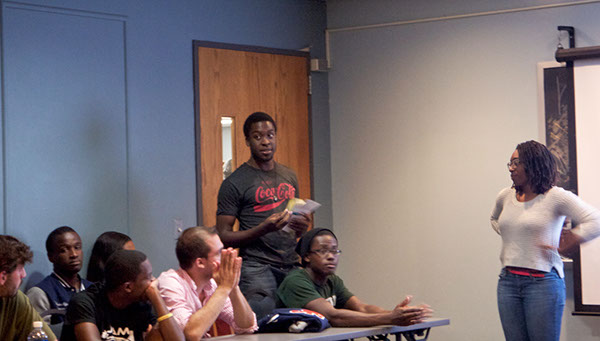

The 58th Student Senate met on Wednesday, Sept. 10. for their weekly meeting.
Beginning with what each member would like to achieve, the Senate for this school year’s agenda is on its way to being defined. Senate members’ matters of importance for this year include creating more of a community, pushing social justice, promoting academic affairs and working to improve the backbone of the Senate, the Constitution.
Another matter of importance was helping non-Student Association (SA) clubs on campus.
The Council of Organizations Chair Esoshani Barton said, “We had a meeting about non-SA recognized clubs and I guess some of the clubs added to that list will be academic fraternities and sororities and some religious clubs.”
In regards to the current clubs on campus, there has been a push for getting sexual assault policies and student opinions the recognition they need.
Senator Cait O’Connor said she is continually speaking to clubs such as Students Advocating for Intersectional Justice (SAIJ) and Take Back the Night, an organization that raises awareness about rape and sexual assault. In lue of the recent movement to change the sexual assault sanctions in the student handbook, students seem to be pleased.
“I got a positive on that. They think that that’s really great that that’s going to happen but they feel like there is definitely more that could be done,” O’Connor said.
With the recent changes in the handbook, four positions have become available in the Judicial Hearing Committee. The committee sits on cases and make decisions in regards to students who violate the student handbook.
The President of the SA Senate, Osato Okundaye, interviewed candidates to fill these positions. He feels that the four who presented their cases all seem worthy of obtaining such a position.
“All of them captivated my trust,” Okundaye said.
Introductions were made, with some candidates previously holding spots in the District Attorney’s office sexual crime unit and other work regarding law. The candidates answered questions about sexual assault actions from current senate members. They discussed how they plan to speak up for those unable to do so and use the handbook as their vessel. All candidates were accepted into the positions.
Second-year Emily London said, “In case of sexual assault it takes a lot of bravery for the survivor to come forward.” Now it is her and the other candidates’ jobs to speak up for those affected, she said.
The Student Concerns Committee, trying to bridge the gap between RHSA and Senate, held elections at the meeting. The committee looked to gain five senate members and five non-senate members. Candidates stated their stance and answered why they would properly fit the position.
Senator Danielle Adames said, “I wanted to be a voice for people who couldn’t make it to senate hearings or couldn’t be heard.”
All students applying for the position were accepted in a senate-wide joint vote.
At the beginning of the meeting, senate members were asked what they were interested in and a big topic was social justice. The Social Justice Coalition held their elections at the meeting with five candidates presenting their case for why they would be good for the job.
Race, sexuality and mental health, spectrum related or depression, were all talked upon.
One candidate, Rabih Ahmed, discussed the bridge between the administration in regards to social issues and the students by calling the administration to action.
“Stop being so vague,” Ahmed said. “Take away from the aggression and speak about the facts.”
